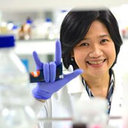A topoisomerase II poison screen of ethnomedicinal Thai plants using a yeast cell-based assay.
Keywords
Abstract
BACKGROUND
The plants used in this study had previously been identified and used by Thai folk practitioners, who had knowledge of Thai traditional medicine, as alternative treatments for cancer. Investigation into the mechanism of the Topoisomerase II (Top2) poison of these plants may give rise to new drug leads for cancer treatment.
OBJECTIVE
This study aimed to screen ethnomedicinal plants used in Thai traditional medicine for Top2 poison activity using a yeast cell-based assay and also to validate the traditional uses of these plants by examining the Top2 poison activity.
METHODS
Thirty Thai medicinal plants were harvested and identified. Plant methanol extracts were prepared and screened in vitro using a yeast cell-based assay. Mutant yeast strains carrying the top2-1 allele, which encodes a temperature-sensitive topoisomerase, were used to establish the yeast spot test. Strains carrying this mutation grow normally at 25°C and generally have a wild-type drug sensitivity. These yeast strains are able to grow at 30°C, but the Top2 activity is greatly reduced at this temperature, which causes the strains to be highly drug resistant to anti-Top2 agents. Cell growth was measured by colony survival after exposure to various concentrations of extracts at different temperatures.
RESULTS
The extracts of six out of thirty ethnomedicinal plants, Curcuma longa, C. zedoaria, Derris scandens, Grangea maderaspatana, Stephania pierrei and S. suberosa, were found to have Top2 poison activity against the yeast cells.
CONCLUSIONS
The yeast screening system confirmed the proposed anti-cancer mechanisms of plants used in Thai traditional medicine by traditional doctors.


